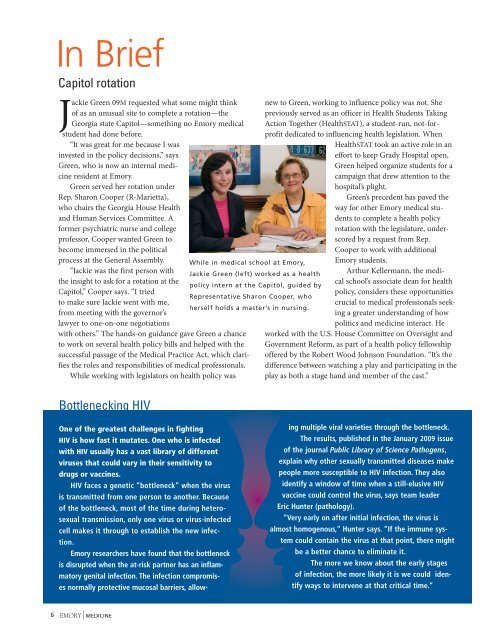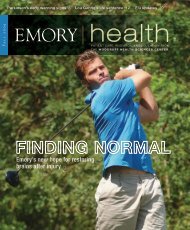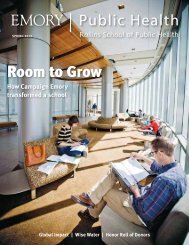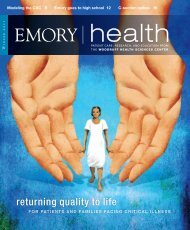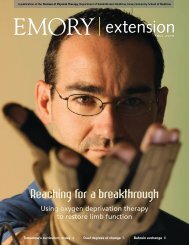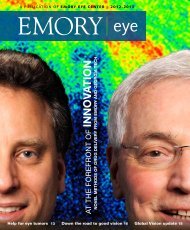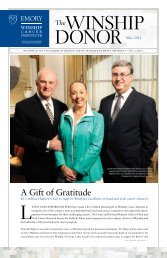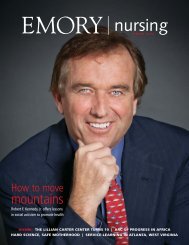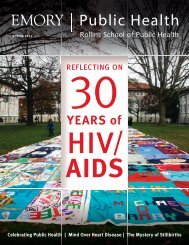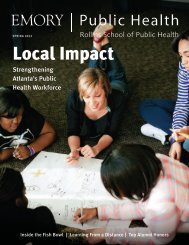medicine - Woodruff Health Sciences Center - Emory University
medicine - Woodruff Health Sciences Center - Emory University
medicine - Woodruff Health Sciences Center - Emory University
You also want an ePaper? Increase the reach of your titles
YUMPU automatically turns print PDFs into web optimized ePapers that Google loves.
6<br />
In Brief<br />
Capitol rotation<br />
J student had done before.<br />
Jackie Green 09M requested what some might think<br />
of as an unusual site to complete a rotation—the<br />
Georgia state Capitol—something no <strong>Emory</strong> medical<br />
“It was great for me because I was<br />
invested in the policy decisions,” says<br />
Green, who is now an internal <strong>medicine</strong><br />
resident at <strong>Emory</strong>.<br />
Green served her rotation under<br />
Rep. Sharon Cooper (R-Marietta),<br />
who chairs the Georgia House <strong>Health</strong><br />
and Human Services Committee. A<br />
former psychiatric nurse and college<br />
professor, Cooper wanted Green to<br />
become immersed in the political<br />
process at the General Assembly.<br />
“Jackie was the first person with<br />
the insight to ask for a rotation at the<br />
Capitol,” Cooper says. “I tried<br />
to make sure Jackie went with me,<br />
from meeting with the governor’s<br />
lawyer to one-on-one negotiations<br />
with others.” The hands-on guidance gave Green a chance<br />
to work on several health policy bills and helped with the<br />
successful passage of the Medical Practice Act, which clarifies<br />
the roles and responsibilities of medical professionals.<br />
While working with legislators on health policy was<br />
Bottlenecking HIV<br />
One of the greatest challenges in fighting<br />
HIV is how fast it mutates. One who is infected<br />
with HIV usually has a vast library of different<br />
viruses that could vary in their sensitivity to<br />
drugs or vaccines.<br />
HIV faces a genetic “bottleneck” when the virus<br />
is transmitted from one person to another. Because<br />
of the bottleneck, most of the time during heterosexual<br />
transmission, only one virus or virus-infected<br />
cell makes it through to establish the new infection.<br />
<strong>Emory</strong> researchers have found that the bottleneck<br />
is disrupted when the at-risk partner has an inflammatory<br />
genital infection. The infection compromises<br />
normally protective mucosal barriers, allow-<br />
EMORY MEDICINE<br />
While in medical school at <strong>Emory</strong>,<br />
Jackie Green (left) worked as a health<br />
policy intern at the Capitol, guided by<br />
Representative Sharon Cooper, who<br />
herself holds a master’s in nursing.<br />
new to Green, working to influence policy was not. She<br />
previously served as an officer in <strong>Health</strong> Students Taking<br />
Action Together (<strong>Health</strong>STAT), a student-run, not-forprofit<br />
dedicated to influencing health legislation. When<br />
<strong>Health</strong>STAT took an active role in an<br />
effort to keep Grady Hospital open,<br />
Green helped organize students for a<br />
campaign that drew attention to the<br />
hospital’s plight.<br />
Green’s precedent has paved the<br />
way for other <strong>Emory</strong> medical students<br />
to complete a health policy<br />
rotation with the legislature, underscored<br />
by a request from Rep.<br />
Cooper to work with additional<br />
<strong>Emory</strong> students.<br />
Arthur Kellermann, the medical<br />
school’s associate dean for health<br />
policy, considers these opportunities<br />
crucial to medical professionals seeking<br />
a greater understanding of how<br />
politics and <strong>medicine</strong> interact. He<br />
worked with the U.S. House Committee on Oversight and<br />
Government Reform, as part of a health policy fellowship<br />
offered by the Robert Wood Johnson foundation. “It’s the<br />
difference between watching a play and participating in the<br />
play as both a stage hand and member of the cast.”<br />
ing multiple viral varieties through the bottleneck.<br />
The results, published in the January 2009 issue<br />
of the journal Public Library of Science Pathogens,<br />
explain why other sexually transmitted diseases make<br />
people more susceptible to HIV infection. They also<br />
identify a window of time when a still-elusive HIV<br />
vaccine could control the virus, says team leader<br />
Eric Hunter (pathology).<br />
“Very early on after initial infection, the virus is<br />
almost homogenous,” Hunter says. “If the immune system<br />
could contain the virus at that point, there might<br />
be a better chance to eliminate it.<br />
The more we know about the early stages<br />
of infection, the more likely it is we could identify<br />
ways to intervene at that critical time.”


